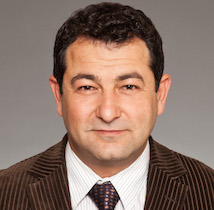Research profile: M. Ali ĂślkĂĽ
M. Ali ĂślkĂĽ, Rowe School of Business
Analytical models for managing circular supply chains
 The earth’s carrying capacity cannot withstand the exponential pace of consumption resulting from the current “take-make-dispose” linear economy (LE) models built on throwaway culture. A strong and sustainable alternative to LE emerged with the concept of a circular economy (CE), aiming to design waste out of the economy and mimic ecosystems. Being at the heart of the economic landscape, supply chains (SCs) need to respond to the necessary shift to CE, and innovative management of circular supply chains (CSCs) requires a broader comprehension of CE and more sophisticated and large-scale analytical decision models. A CSC is a sustainable and resilient SC designed to end waste by valorizing any material flows in shortened loops and slowing down consumption. A CSC requires systems-thinking and compliance with quadruple bottom-line imperatives (cultural, economic environmental and societal long-term wellbeing). A CSC creates restorative and regenerative products and processes, while co-creating with stakeholders (across multiple industries, public sectors and consumer markets) a shared value via the circulation of resources (raw materials, by-products, end-of-life and end-of-use products, disposed waste, process capabilities), and timely and transparent information.
The earth’s carrying capacity cannot withstand the exponential pace of consumption resulting from the current “take-make-dispose” linear economy (LE) models built on throwaway culture. A strong and sustainable alternative to LE emerged with the concept of a circular economy (CE), aiming to design waste out of the economy and mimic ecosystems. Being at the heart of the economic landscape, supply chains (SCs) need to respond to the necessary shift to CE, and innovative management of circular supply chains (CSCs) requires a broader comprehension of CE and more sophisticated and large-scale analytical decision models. A CSC is a sustainable and resilient SC designed to end waste by valorizing any material flows in shortened loops and slowing down consumption. A CSC requires systems-thinking and compliance with quadruple bottom-line imperatives (cultural, economic environmental and societal long-term wellbeing). A CSC creates restorative and regenerative products and processes, while co-creating with stakeholders (across multiple industries, public sectors and consumer markets) a shared value via the circulation of resources (raw materials, by-products, end-of-life and end-of-use products, disposed waste, process capabilities), and timely and transparent information.
With CSCs being the umbrella theme of his current research program, some of Dr. Ülkü’s ongoing projects include the development of mathematical programming of CSC input-output models, optimal shipment consolidation policies for green urban logistics and the integration of intelligent technologies such as blockchain, internet-of-things and artificial intelligence for sustainable production and consumption in CE for food, clothing and electronic products.
